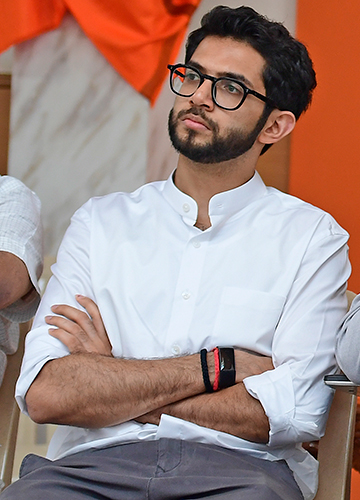Q/ What have you learnt from interacting with the people?
A/ Farmer discontent is still very high. The farm-loan waiver hasn’t benefited everyone. They are very angry. The women in farms—landless labourers—don’t have enough welfare schemes. Students are worried about the growing unemployment and economic crisis. Plus, we need an education reform very soon.
Farmer discontent is caused by a lot of systemic errors. The schemes are there, but the money is not reaching the farmers. A lot of them took crop insurance, but when the crops got damaged, the [insurance] companies never reached out to them. After the Shiv Sena protested, 10 lakh farmers got 0960 crore. As of now, there are about 80 lakh more across the country who are yet to get their due.
Q/ So, have the government’s policies failed?
A/ No, the policies are fine. It is the red-tapism that has led to these systemic errors.
Q/ People are chasing you like a Bollywood star.
A/ (Laughs) I will have to call [director] Karan Johar now and show him my fan following. The thing is that I have been working in Maharashtra for the past nine years and have taken up several issues. This love is, I think, a form of appreciation for whatever we have been doing. I hope I live up to the faith they have in me.
Q/ Is the Sena agreeable to being a junior partner if the BJP-Sena alliance returns to power?
A/ It is more important to be in the government and serve the people. Partnerships are more important.
Q/ Will seat-sharing issues break the alliance?
A/ The alliance has always been like this throughout the past 30 years. The issues are coming to the forefront now only because we are in power. The media attention is much more, and [there is also] social media. The Sena and the BJP have always had issues, as we are two cadre-based political parties and we have to voice our opinions. Seat-sharing is discussed between Uddhavji—my father [Uddhav Thackeray]—and the chief minister. I have no idea about it.
Q/ How important is Konkan for you?
A/ It has traditionally been the Shiv Sena’s base. People from Konkan have been working for us in Mumbai. They have been representing the Sena at various levels of the government, right from the Lok Sabha and the assembly to the Brihanmumbai Municipal Corporation. There are six seats [in Konkan], of which we have always contested and won five. Our MPs have been serving for years and decades. This is our backyard.
Q/ But people from Konkan say they do not want to migrate for work.
A/ This is one of the issues here. We are trying to bring industries, but we need to strike a balance between [protecting the] environment and sustainable development. Konkan can be the heart of Maharashtra’s tourism. Ecotourism can be developed. The region has cashews, mangoes and chillies, which can be exported on a much bigger scale than what is happening now. So we are working towards formalising that economy. Also, Konkan can give water to the rest of Maharashtra, and that is another area we can generate revenue from.
Q/ Some say you are far too young and inexperienced to lead a state.
A/ I have been in [politics] for nine years. New blood and fresh perspective are needed. Experience is needed for good advice, but sometimes experience can bog you down, too. Without experience, there are certain jumps you can take without fear. And the party is well-experienced. I believe in a combination of hosh (sensibility) and josh (enthusiasm).
Q/ Will you contest the elections and will you be the next chief minister?
A/ That depends on the people and the order they give me. I don’t shy away from responsibilities. So if I get the responsibility, I would try and execute it to the best of my ability.
Q/ You have hired a public relations team that has been working to give an impression of you being a sophisticated millennial.
A/ That means I need to hire another PR machinery now to break that image.
See, one has to always be a pro. Today, there is no running away from that. But, at the same time, it is important to strike a balance between supporting sustainable development and farming. If you place the Shiv Sena on a political chart, you would notice that we are everywhere—left, right and centre. We come across as right-wing only because we speak about the Ram Mandir; at the same time, we also speak against lynchings. You cannot call us left-wing just because we have unions in every hotel and in every sector; we also promote industries and listen to our farmers.
Q/ Should the government control the people’s eating habits? Do you support the beef ban?
A/ The beef ban is because of a particular sentiment in the country and that should be respected. The ban is justified only for the cow slaughter part of it. Otherwise, I believe the government has no business controlling what people eat and wear, and where they go. As long as you don’t hurt the sentiments of others and don’t steal anyone else’s food, you are good.
Q/ What have you learnt from your grandfather?
A/ Being relevant to the times. I remember this one interesting moment in 2010-11, when he might have been in his early eighties. It was our first annual Yuva Sena day and I wanted to record a speech from him for those aged 18 to 20. To my sheer surprise, he spoke about Facebook, social media, Julian Assange and WikiLeaks. His entire speech was youth-based. So he connected with the masses very quickly; he has always known the pulse of the masses. I would like to emulate that.


